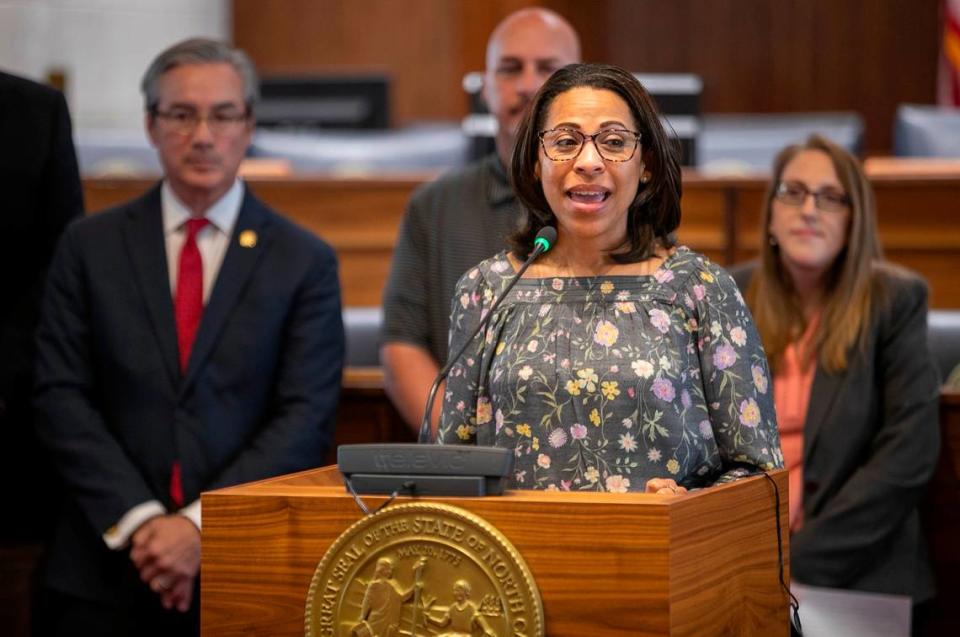NC lawmakers are backing universal school vouchers. Here’s why that’s controversial.
A series of school-choice related bills that could overhaul where North Carolina children attend school were backed Tuesday by a state House committee.
The North Carolina House K-12 Education committee advanced a bill that would expand the Opportunity Scholarship program to allow any family to get a private school voucher. An identical bill was backed last week by the Senate Education Committee.
Other bills backed by the House Education committee would transfer approval of charter schools to a more charter-friendly group and make it easier for charter schools to add students.
The three bills would likely accelerate a trend that has seen enrollment drop in North Carolina’s traditional public schools while it’s risen in charter schools, private schools and homeschooling.
“Why would we not want to expand choices of consumers, the opportunities of students even more in education?” said House Speaker Tim Moore, a Kings Mountain Republican.
But critics said it’s a dark day for public education in North Carolina.
“It’s going to devastate our public schools,” said Rep. Julie von Haefen, a Democrat from Apex. “We have billions of dollars that we owe to fulfill our constitutional responsibility.”
Democratic lawmakers have urged the GOP majority to fund the Leandro plan, which would help fund programs to try to provide every child with a sound, basic education. The plan is up in the air after the new Republican majority on the state Supreme Court blocked an order requiring the money transfer.
Opportunity Scholarships
House Bill 823 eliminates income eligibility limits for voucher recipients to get taxpayer funding to attend a K-12 private school. Vouchers would be awarded based on a sliding scale with lower-income families getting the most money.

In addition to dropping income caps, the bill would also sharply expand state funding for the program.
The legislation is expected to become law this year because Republicans now have large enough majorities to override vetoes from Democratic Gov. Roy Cooper.
“It’s a pretty exciting day in North Carolina for those who believe in education reform and I am one of those,” said Rep. Tricia Cotham, a Mecklenburg County Republican whose recent defection from the Democratic Party gave the GOP a legislative supermajority.
But other lawmakers said the program’s expansion would come at the expense of traditional public schools.
“This bill sort of in my opinion poses a great threat to our public education system,” said Rep. Rosa Gill, a Wake County Democrat. “It does not in my opinion advance the stated goals of fostering greater choice as this funding will go to families who already send their children to private schools.”
Gill’s amendment to say that students currently attending private schools would be ineligible for a voucher was rejected Tuesday.
Charter school approvals
Charter schools are taxpayer funded schools that are exempt from some of the rules that traditional public schools must follow. There are more than 200 charter schools statewide.
Currently, the N.C. Charter Schools Advisory Board recommends to the State Board of Education which new charters to approve and which existing ones should be renewed. But the state board recently rejected two charter schools recommended by the advisory board.
Under House Bill 618, the advisory board would be renamed the Charter School Review Board and take over making the decisions on charter approvals and renewals. The state board would be limited to setting policies and rules for charter schools and hearing appeals of decisions made by the Review Board.
The advisory board is made up mainly of members appointed by the Republican-led General Assembly. Members are required under state law to have “a commitment to charter schools.”
The majority of State Board of Education members were nominated by Democratic Gov. Roy Cooper.
Cotham said the change would streamline the approval process. But von Haefen said it would weaken the constitutional power of the state board.
Charter school enrollment
Under House Bill 219, multiple changes would be made to how charter schools are operated and funded.
Under the bill, charter schools that are not low-performing would no longer be limited in how much they can increase their enrollment. They previously had to get state approval if they wanted to increase their enrollment by more than 30% annually.
The bill would also allow low-performing charter schools to increase their enrollment by up to 20% without state approval.
“Our goal is to raise all low-performing schools, both in charter as well as traditional public schools,” said Rep. John Torbett, a Stanley Republican. “ I don’t think they necessarily need to be hand spanked for not getting there.”
The bill was amended Tuesday to change how charter schools and private schools would be classified for high school sports. Their classification would now be based on the athletic division where the largest percentage of their students would have played if they stayed in traditional public schools.
The committee also removed wording that would have required school districts to begin sharing with charter schools the money they get from grants; donations; rental fees from use of school facilities; Pre-K funds; fund balance and reimbursements from programs such as Medicaid; and the federal Free and Reduced Lunch program.

